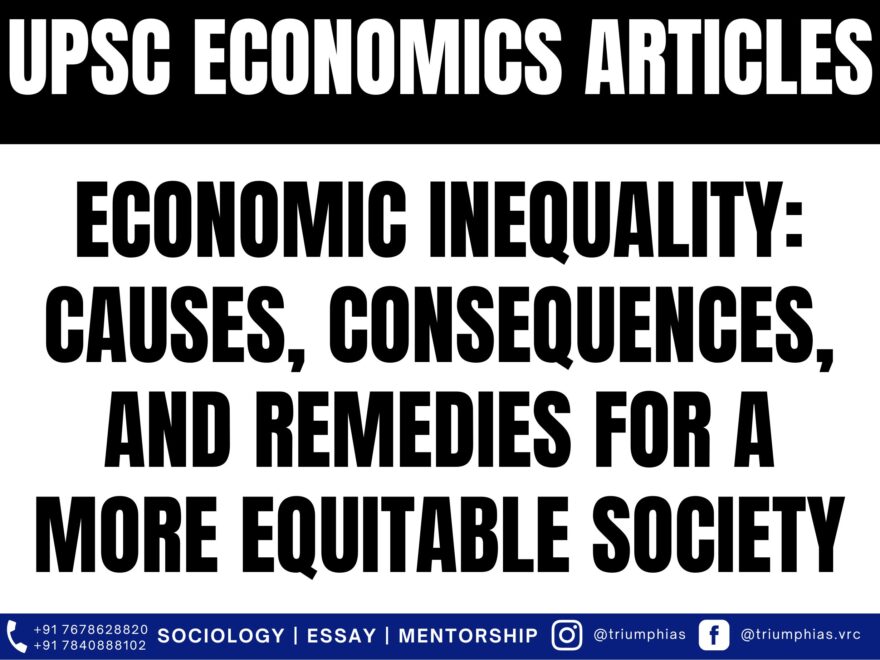Economic Inequality
(Relevant for Economics section of General Studies Paper Prelims/Mains)

Economic disparity signifies the uneven distribution of both income and opportunities among various segments within a society.
Reasons for disparities
- Historical Underpinnings: The persistent discrimination faced by specific social segments since historical epochs has hindered their access to education, employment, and healthcare. Despite the implementation of measures like Reservations post-Independence, their impact has been primarily limited to economic and political spheres and has not significantly addressed social advancement.
- Gender Disparities: Women have traditionally been subjected to subordination, rendering them with fewer choices in life. The notion that educating girls is a financial burden on families has restricted their access to education, while limited employment options further compound their inequality.
- Pervasive Informal Labor: An overwhelming 80% of India’s labor force operates within the informal sector. This form of employment lacks stability, regular remuneration, and social safety nets, thereby exacerbating the wage differential between the formal and informal sectors.
- Agriculture Predicament: Despite a substantial segment of the population still relying on agriculture, the sector’s contribution to the overall GDP is diminishing.
- Disparities Across States: Economic growth has exhibited disparities across sectors and geographic regions. For instance, while the Green Revolution yielded unequal benefits, with Western and Southern India profiting more than their Eastern counterparts.
- Globalization’s Influence: The effects of globalization, including trade liberalization through platforms like the WTO, have amplified economic inequality, disproportionately favoring the affluent and negatively affecting local investors and producers.
- Thomas Piketty’s Perspective: According to economist Thomas Piketty’s research, there has been a gradual reduction in tax progressivity, a tool that can help curb the rise in inequality. Additionally, privatization measures have led to increased wage inequality as government-set pay scales, which were less unequal, were removed.
- Skill Gap and Jobless Expansion: Inadequate emphasis on skill development and the phenomenon of jobless growth have further widened the gap between different economic strata.
What can be done to reduce inequality
- Governments can take steps to diminish inequality by rejecting the dominance of market fundamentalism, opposing the vested interests of powerful elites, and reforming the regulations and systems that have contributed to the existing disparities. These actions must encompass implementing measures that restructure wealth and authority to level the playing field.
- There are primarily two crucial domains where policy changes could enhance economic equity: taxation and social expenditure. The significance of progressive taxation, which requires corporations and the wealthiest individuals to contribute more to the state to redistribute resources across society, cannot be understated. This role of taxation in lessening inequality has been well-documented across OECD and developing countries. The impact of tax can either be progressive or regressive, contingent on the government’s policy preferences.
- Social spending on vital public services like education, healthcare, and social protection also plays a pivotal role. Comprehensive evidence spanning more than three decades and encompassing over 150 countries, both affluent and impoverished, underscores that investments in public services and social safeguards can effectively combat inequality. Oxfam has been a long-standing advocate for universal, cost-free public services.
- Efforts should be directed towards liberating women from the countless unpaid hours they devote to family and household duties each day. Enhancing public services such as water, electricity, and childcare, which can diminish the time required for this unpaid labor, is essential. These services should be tailored to accommodate those who have limited time at their disposal.
- Amplifying employment opportunities is critical, along with ensuring free access to high school education and expanding the availability of functional health facilities.
- The concept of Universal Income Support should be embraced, as recommended by the Economic Survey 2016-17, suggesting that universal basic income should supplant, rather than supplement, existing social welfare programs.
- Investments in human capital and public resources yield substantial positive impacts on private-sector productivity, with estimated returns ranging from 15% to over 45%. Enhanced human productivity not only bolsters labor productivity but also stimulates innovation and enhances the capacity to adopt novel technologies.
- Measures ought to be adopted to bridge the immense wealth disparity that persists across different societal strata. A one-time windfall tax of 99% on the wealth gains of the top 10 richest individuals during the Covid-19 pandemic alone could generate $812 billion.
- Implementing a wealth tax ranging from 1% for wealth exceeding $1 million to 3% for global billionaires could generate 1.6% of global income.
- Efforts to combat wealth disparity in unequal societies should include eradicating caste discrimination.
- Policymakers should prioritize making technology more affordable and widespread.
- Investment in women is crucial. According to the IMF, if women’s participation in the workforce matched that of men, Japan’s growth could reach 9% per annum, while India’s could soar to 27%. It is imperative to focus on genuine solutions rather than indulging in a blame game.
- Addressing asset inequality can be achieved through redistributive land reforms and inheritance taxes, while also curbing monopolies over water, forests, mineral resources, and financial power.
- Supporting agriculture is essential, given that the World Bank asserts that agriculture can uplift 80% of the global poor residing in rural areas.
- Creating opportunities for disadvantaged communities and youth should be a priority.
- Domestic resource mobilization must be encouraged, and initiatives to foster development in both the public and private sectors should be undertaken.
- Promoting sectoral training, apprenticeships, and earn-while-you-learn programs can contribute to skills development.
- Raising the minimum wage and linking it to inflation is a vital measure.
To master these intricacies and fare well in the Sociology Optional Syllabus, aspiring sociologists might benefit from guidance by the Best Sociology Optional Teacher and participation in the Best Sociology Optional Coaching. These avenues provide comprehensive assistance, ensuring a solid understanding of sociology’s diverse methodologies and techniques.
economic inequality, disparities, historical discrimination, gender disparities, informal labor, agriculture, regional differences, globalization, taxation, social expenditure, social protection, public services, skill development, wealth tax, employment opportunities, universal income, asset inequality, women empowerment, minimum wage, Best Sociology Optional Coaching, Sociology Optional Syllabus.

Choose The Best Sociology Optional Teacher for IAS Preparation?
At the beginning of the journey for Civil Services Examination preparation, many students face a pivotal decision – selecting their optional subject. Questions such as “which optional subject is the best?” and “which optional subject is the most scoring?” frequently come to mind. Choosing the right optional subject, like choosing the best sociology optional teacher, is a subjective yet vital step that requires a thoughtful decision based on facts. A misstep in this crucial decision can indeed prove disastrous.
Ever since the exam pattern was revamped in 2013, the UPSC has eliminated the need for a second optional subject. Now, candidates have to choose only one optional subject for the UPSC Mains, which has two papers of 250 marks each. One of the compelling choices for many has been the sociology optional. However, it’s strongly advised to decide on your optional subject for mains well ahead of time to get sufficient time to complete the syllabus. After all, most students score similarly in General Studies Papers; it’s the score in the optional subject & essay that contributes significantly to the final selection.
“A sound strategy does not rely solely on the popular
Opinion of toppers or famous YouTubers cum teachers.”
It requires understanding one’s ability, interest, and the relevance of the subject, not just for the exam but also for life in general. Hence, when selecting the best sociology teacher, one must consider the usefulness of sociology optional coaching in General Studies, Essay, and Personality Test.
The choice of the optional subject should be based on objective criteria, such as the nature, scope, and size of the syllabus, uniformity and stability in the question pattern, relevance of the syllabic content in daily life in society, and the availability of study material and guidance. For example, choosing the best sociology optional coaching can ensure access to top-quality study materials and experienced teachers. Always remember, the approach of the UPSC optional subject differs from your academic studies of subjects. Therefore, before settling for sociology optional, you need to analyze the syllabus, previous years’ pattern, subject requirements (be it ideal, visionary, numerical, conceptual theoretical), and your comfort level with the subject.
This decision marks a critical point in your UPSC – CSE journey, potentially determining your success in a career in IAS/Civil Services. Therefore, it’s crucial to choose wisely, whether it’s the optional subject or the best sociology optional teacher. Always base your decision on accurate facts, and never let your emotional biases guide your choices. After all, the search for the best sociology optional coaching is about finding the perfect fit for your unique academic needs and aspirations.
To master these intricacies and fare well in the Sociology Optional Syllabus, aspiring sociologists might benefit from guidance by the Best Sociology Optional Teacher and participation in the Best Sociology Optional Coaching. These avenues provide comprehensive assistance, ensuring a solid understanding of sociology’s diverse methodologies and techniques. Sociology, Social theory, Best Sociology Optional Teacher, Best Sociology Optional Coaching, Sociology Optional Syllabus.
Best Sociology Optional Teacher, Sociology Syllabus, Sociology Optional, Sociology Optional Coaching, Best Sociology Optional Coaching, Best Sociology Teacher, Sociology Course, Sociology Teacher, Sociology Foundation, Sociology Foundation Course, Sociology Optional UPSC, Sociology for IAS,
Follow us :
🔎 https://www.instagram.com/triumphias
🔎https://www.youtube.com/c/TriumphIAS
https://t.me/VikashRanjanSociology
Find More Blogs
|
Scope of the subject and comparison with other social sciences |
|||
|
|
|
|
Modernity and social changes in Europe |

